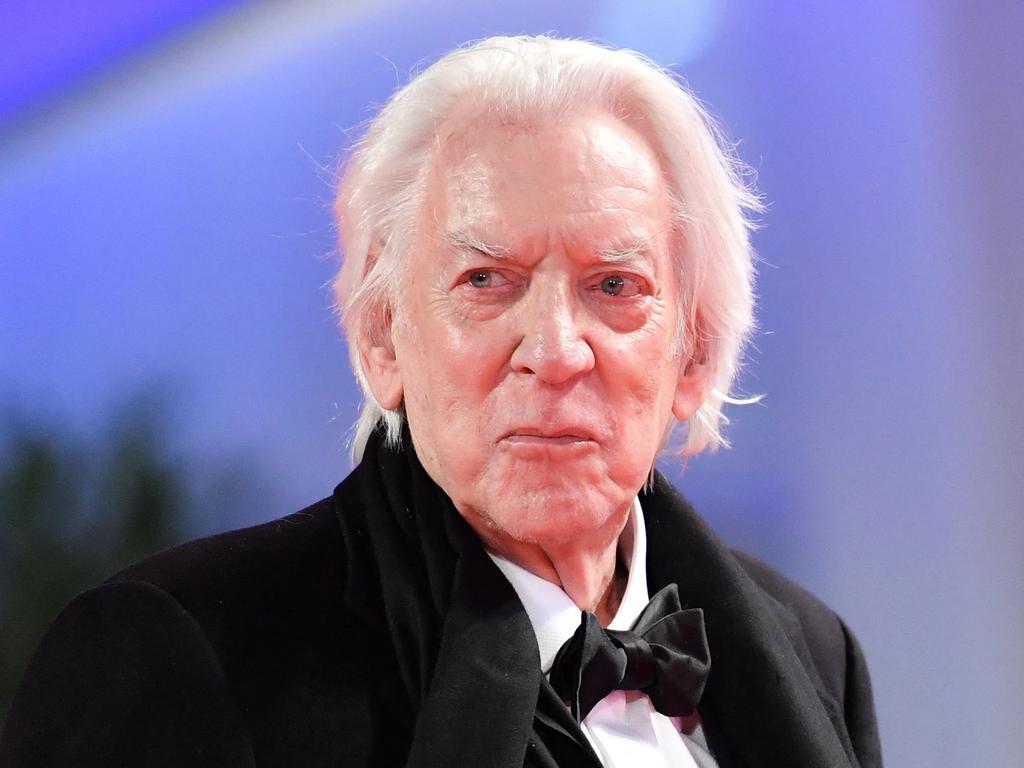From unlikely sex symbol to tyrannical president, Sutherland reached across the generations
Donald Sutherland rose to prominence in films M*A*S*H and Kelly’s Heroes; nearly 50 years later he was appealing to a whole new audience in The Hunger Games.
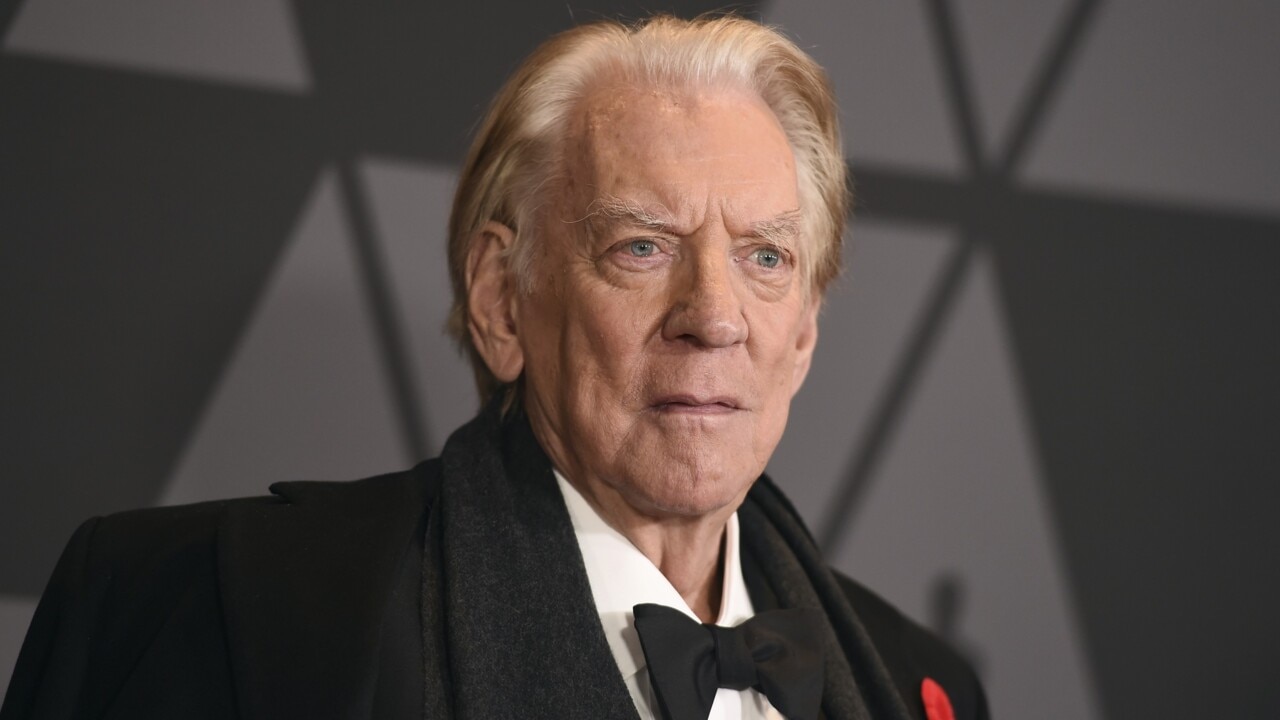
Donald Sutherland enjoyed the irony of appearing in one of cinema’s steamiest scenes — up to that point he had often been described as gangling, slouching, droopy-eyed and big-eared. While filming the 1973 thriller Don’t Look Now, the director Nicolas Roeg instructed him and his co-star, Julie Christie, to walk into the bedroom naked.
“I didn’t take my clothes off very often,” he said. “Holy cow. Julie and I walked in like Adam and Eve and we didn’t really know each other. We laid on the bed and the director said, ‘All right Julie pull your knees up to your shoulder. Donald take your mouth and slide it down the inside of her left thigh.’ It went on like this for 12 hours. Neither of us could speak afterwards.”
The resulting scene was one of the first to depict sex realistically in a mainstream film, although Sutherland — unlike Christie — always denied rumours that the sex had been real. It made the offbeat actor into a sex symbol, but then he quickly learnt that his life in film was nothing if not random.
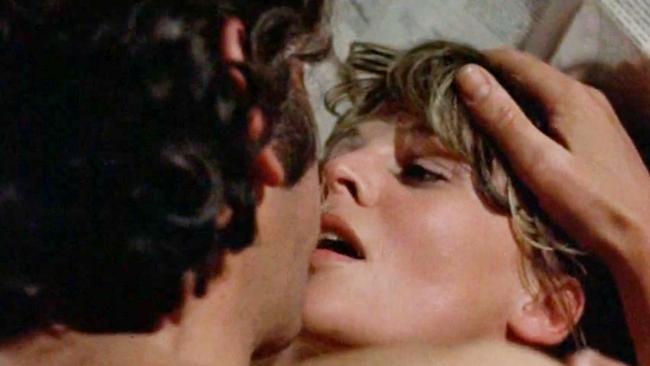
He had risen to prominence in the 1967 war film The Dirty Dozen. His role was a small one until the day he was sitting around a table with Lee Marvin, Charles Bronson, John Cassavetes and other members of the cast who were arguing about which of them was going to impersonate a German general. “Aldrich [the director Robert Aldrich], who made decisions faster than you can imagine, looked down the table, saw my shaved head, but didn’t know my name. He said, ‘You with the big ears, you do it.’ That changed everything.”
He still did not have many lines, but the scene, which comes towards the climax of the movie, gave him the chance to employ various physical tics as the suspense of the mission builds and he is forced to hang around outside the mansion where Marvin has infiltrated a meeting of German top brass.
Sutherland’s naturally laid-back demeanour was complemented by a warm chuckle and distinctive little whistle, spectacles and what looked like an angler’s hat when he played an army surgeon in the original 1970 film version of M*A*S*H. Shooting was reported to have been chaotic, the film was episodic in structure, the acting was naturalistic with Robert Altman pioneering his famous “overlapping dialogue” and the end result contained more blood than a Peckinpah western. Nevertheless it was one of the biggest hits of the year.
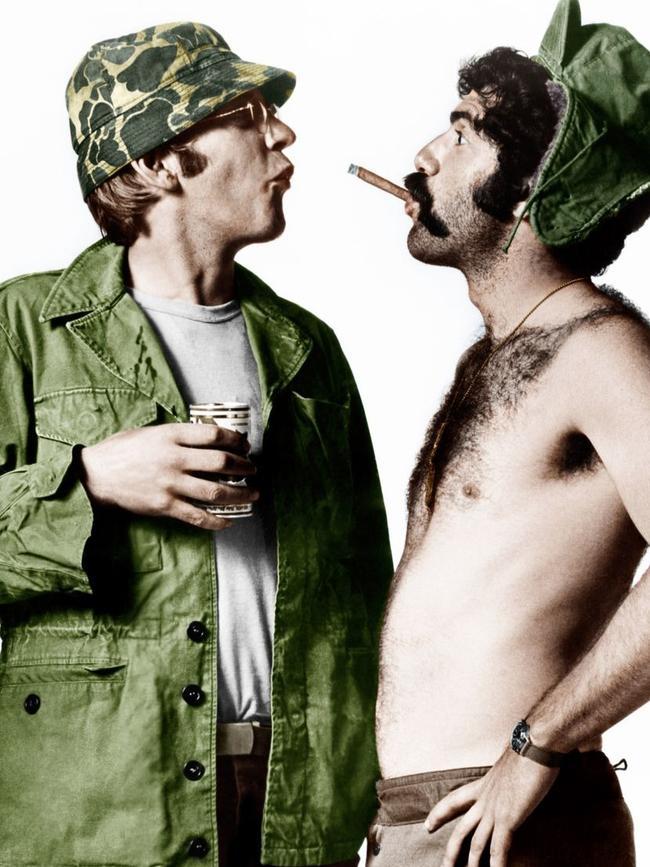
It was followed by Clint Eastwood’s war film Kelly’s Heroes, in which Sutherland presented a vision of detached cool as a hippy tank commander while the craziness of war rages around him.
Although his three early hits were all set during either the Second World War or the Korean War, Sutherland was very much a part of the Zeitgeist and became a countercultural figure both on-screen and off. He had a three-year affair with Jane Fonda, his co-star in Klute (1971), in which he played the titular private detective, while Fonda played a prostitute mixed up in his case. The couple became prominent campaigners against the Vietnam War.
Sutherland was described as one of the finest actors never to win an Oscar, although many thought he was “robbed” when he was not even nominated for a brilliant 15-minute cameo as the Pentagon whistleblower Colonel X in Oliver Stone’s JFK.
Offbeat and relaxed, Sutherland was never overly reverential about his craft, once saying: “When I’m acting I’m just the director’s concubine. I just do what he wants as perfectly as I can.”
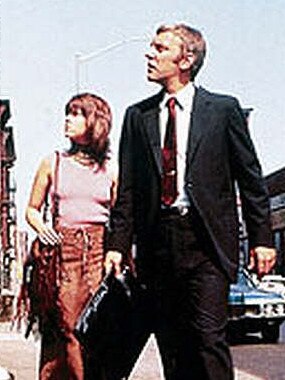
Donald McNichol Sutherland was born in Saint John, New Brunswick, in 1935, to Frederick, a salesman, and Dorothy (nee McNichol). As the name suggests, the family were originally from Scotland, though they also had English and German ancestry. He grew up largely in Nova Scotia, where he attended Bridgewater High School and in his teens worked as a reporter and disc jockey for a local radio station. At Toronto University he opted for the unusual combination of engineering and drama. Thinking about a career in acting, he once asked his mother if he was good looking. She replied: “No, but your face has a lot of character.”
Intent on becoming an actor, he headed for England in 1957 and enrolled at the London Academy of Music and Dramatic Art, but dropped out after a year. In 1959 he married Lois Hardwick, an actress whom he had met in Canada, and they found work at the Perth Repertory Theatre in central Scotland, appearing in several plays there in the early 1960s, including Inherit the Wind.
Back in London in the mid-1960s he was in several episodes of The Saint, The Avengers and Man in a Suitcase. He also began securing film roles and played an American doctor who discovers his wife is a vampire in one of the segments of Freddie Francis’s Dr Terror’s House of Horrors (1965), the film that inspired Steve Coogan’s comedy series Dr Terrible’s House of Horrible (2001).
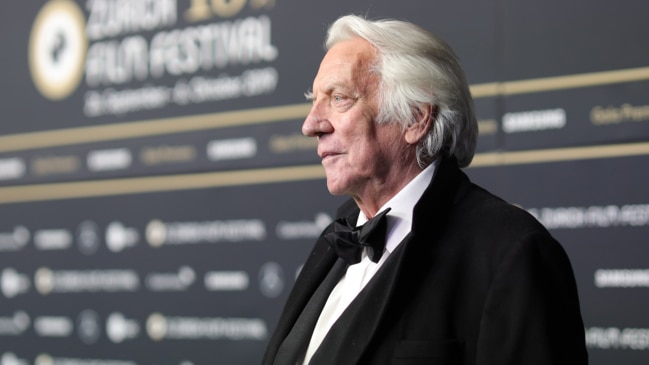
The Dirty Dozen was his first major break. It featured a team of psychopathic military prisoners who are given the chance to redeem themselves on a dangerous operation behind enemy lines. Lee Marvin played the officer in charge, while the prisoners themselves were divided into a group of stars, including Charles Bronson and Telly Savalas, and — as Sutherland put it — “the bottom six”, who were there to make up the numbers.
One of his more interesting roles from the period was in Dalton Trumbo’s Johnny Got His Gun (1971), in which Timothy Bottoms plays a soldier who has lost his limbs, eyes, ears and mouth, and Sutherland was Christ, to whom he appeals for help. But it was not a commercial success.
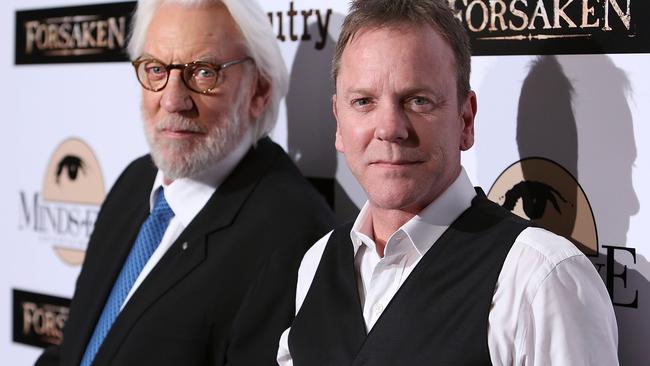
Sutherland subsequently turned his back on Hollywood and made several films in Europe, playing the title role in Federico Fellini’s Casanova (1976). He later described Fellini as his favourite director because “he has even made my face into something I like”. He appeared as a child-rapist and fascist killer in Bernardo Bertolucci’s period epic 1900 (1976) and was impressive as the man who realises the awful truth in the 1978 remake of Invasion of the Body Snatchers. He was a dope smoking college professor in John Landis’s cult comedy Animal House (1978) and the father in Robert Redford’s earnest Oscar-winning family drama Ordinary People (1980).
By the end of the 1970s his brief period as a leading man was virtually over and he was moving towards character roles, playing a sadistic British sergeant-major in the British-financed historical flop Revolution (1985) and a liberal South African schoolteacher in A Dry White Season (1989), with Marlon Brando.
His second marriage, to Shirley Douglas, lasted from 1966 to 1971. Douglas was involved in the Black Panther movement. While filming Kelly’s Heroes, his co-star Clint Eastwood approached Sutherland and said: “I’ve got some bad news for you. Your wife has been arrested. It seems she tried to buy some hand grenades from the CIA.”
He is survived by their twins, Kiefer, who became a successful Hollywood actor in his own right, and Rachel.
The marriage ended in divorce and soon afterwards Sutherland became involved with Jane Fonda. With opposition to American involvement in the Vietnam War growing, Sutherland and Fonda put together a revue called FTA (Free The Army) and staged it in venues near military bases. He described their affair as “very bright, hot and terrific and then it ended.” The break up, he said, was “very painful, but it was terrific to be upset. It was very invigorating”.
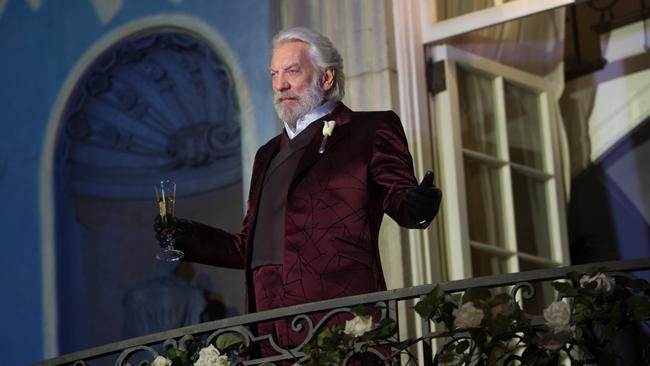
He eventually settled down with the Canadian actress Francine Racette, whom he married and with whom he had three more children, Roeg, Rossif and Angus.
His career picked up again in the Nineties. Roles included a New York art dealer forced to reconsider his values by the arrival of a stranger, played by Will Smith, in the drama Six Degrees Of Separation (1993) and one of Clint Eastwood’s team of veteran astronauts in Space Cowboys (2000).
The John Grisham adaptation A Time to Kill (1996) enabled him to realise his ambition of appearing on screen with his son Kiefer. He was Nicole Kidman’s minister father in Cold Mountain (2003) and even for a generation that had never seen M*A*S*H and Kelly’s Heroes, he was a familiar face. He had reached a stage where he could pick and choose his roles, and do nothing, if he wanted.
In later years Sutherland took on character roles in a wide range of films and television series, proving equally adept at fatherly figures and villains. He could be enormously charming, though his wolfish grin could hide, or hint at, sinister intent. He was a curious but inspired choice as Mr Bennet, the long-suffering husband and father, in the 2005 version of Pride and Prejudice, and he made a memorably Machiavellian senator in the TV series Commander in Chief.
He continued to make films into his eighties. His best-known role in recent years was President Snow in four Hunger Games films.
If there was one lesson he had learnt from Hollywood it was that anyone who promises a sure-fire hit is lying. “Al Pacino and I sat on the top of a hill once when we were doing Revolution and he said ‘I’ve never said it before in my life, but this one really I believe will be great.’ And it wasn’t. It’s impossible to tell.”
Donald Sutherland, actor, was born on July 17, 1935. He died after a long illness on June 20, 2024, aged 88
The Times

